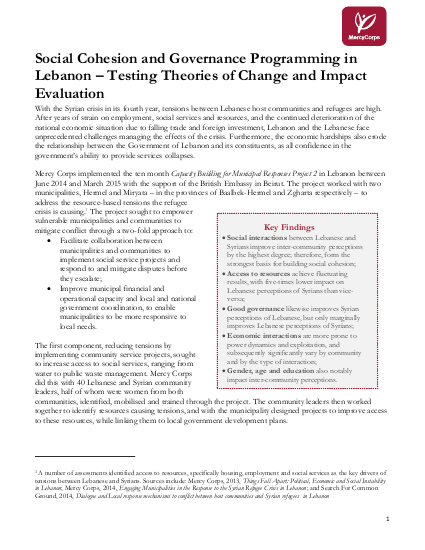
With the Syrian crisis in its fourth year, tensions between Lebanese host communities and refugees are high. Mercy Corps implemented the ten-month Capacity Building for Municipal Responses Project 2 in Lebanon between June 2014 and March 2015 with the support of the British Embassy in Beirut. The project worked with two municipalities, Hermel and Miryata – in the provinces of Baalbek-Hermel and Zgharta respectively – to address the resource-based tensions the refugee crisis is causing.
To both test the project’s Theories of Change and measure impact, Mercy Corps utilised household surveys at baseline and endline, and included control locations to ensure change could be attributed to the project. We found that the needs and positions of host and refugee communities are different – the current international focus on increasing access to social services is not achieving the expected uniform impact improving perceptions; consequently, is insufficient to build social cohesion. Rather, access to social services must be combined with facilitating social interactions between the Lebanese and Syrian communities. The purpose of this document is to outline these key findings to inform programming in Lebanon and broader social cohesion strategy.
Resource collections
- Evaluating humanitarian action
- Monitoring of humanitarian action
- UN Habitat - Urban Response Collection
- Urban Response - Urban Crisis Preparedness and Risk Reduction
- Urban Response Collection - Community Engagement and Social Cohesion
- Urban Response Collection - Economic Recovery
- Urban Response Collection - Environment and Climate Change
- Urban Response Collection - Housing, Land and Property
- Urban Response Collection - Urban Crisis Response, Recovery and Reconstruction
- Urban Response Collection - Urban Resilience